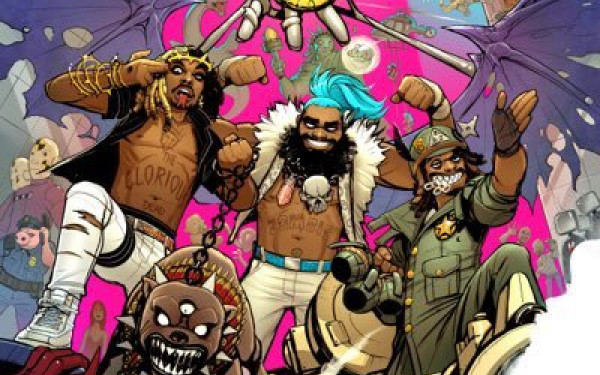A Hip-Hop Artist Turned Concordia Professor
Yassin Alsalman, a.k.a. The Narcicyst, Tries to Be a “Conduit for Free Thought” in Class
I could hear the music getting louder as I approached the door—this was not my imagination. MF Doom’s Potholderz was playing full blast on the professor’s MacBook Pro.
A short, young-looking man with a black beard, big round glasses and a toque that read “POUTINE” was bobbing his head to the music.
So this was the famous “Narcicyst” my friends were raving about, the MC turned professor.
“Now who here is a hip-hop head?” he asked once the class had settled down. A few raised their hands. “Come on guys, this is a hip-hop class! I wanna hear you. Who here is a hip-hop head?”
Hands shot up, tired eyes widened and the class’s attention was captured.
Yassin Alsalman—or, as many know him, “Narcy”—is a 32-year-old hip-hop artist, published author and Fine Arts professor at Concordia.
He teaches a course called “Hip-Hop: Past, Present and Future.” As an entertainer and professor for roughly the same age group, he manages to bridge the gap between both worlds and not only have students look up to him, but respect him.
For Alsalman, the seemingly conflicting worlds of academia and hip-hop complement each other.
“I’m not interested in being a teacher per se; more a conduit for free thought,” he says.
“My classes tend to revolve around critical thinking and challenging the students to step out of their comfort zone of not only learning patterns, but their existing environment.”
Alsalman learned this type of approach from Yasmin Jiwani, a professor in communications at Concordia.
“Yassin is incredibly intelligent and has the ability to reach across a large span of people. He really picks up on contemporary issues and is not afraid to challenge them,” says Jiwani.
The professor really admires his work and often uses his music videos in her classes. More than anything, Jiwani said that Alsalman has the ability to transcend and speak in any given situation he is put in, which he pushes his students to do as well.
One Friday, Alsalman conducted an open debate about race in hip-hop. It wasn’t like any class I’d ever experienced—people were speaking their minds, thinking critically and considering different views.
We were asked how to change racial stereotypes. Students were eager to participate; by then, we had stepped far out of our comfort zones.
One student, Andres Gonzalez, said, “Classes like this are what will change racial stereotypes. We need teachers to open up discussions in classrooms because our media purposefully shifts our focus away from this.”
I overheard students talking about the debate long after class was over. “He wants to learn from us as much as we could learn from him,” said student Nick Woodcock.
Being a professional orator on stage helps him grasp the attention of a classroom, says Alsalman. “Being on stage, I always have something to say,” he says, “so it helps me get comfortable and confident enough to present.”
In front of the class, Alsalman is clearly at ease. Students can tell that it’s more than academic preparedness. He makes eye contact, laughs with us, and takes us seriously. It is easy, not intimidating, to speak your mind in his class.
As Narcy, Alsalman’s music is largely based on his identity as an Iraqi-Canadian. He raps about injustice, discrimination and “The Fear of an Arab Planet.”
In his book The Diatribes of a Dying Tribe, Alsalman says Iraq has been “in a constant state of destruction [his] whole life,” and that all four members of one of his hip-hop groups, Arab Summit, left their mother culture at a breaking point of systematic bullying from the West and neighbouring states.
Alsalman found a place to develop his somewhat conflicting identity in hip-hop, which he defines as a home for the alienated and displaced.
In last year’s hip-hop class, a student refused to show up because another class member boycotted Israeli products in protest of Israel-Palestine violence. To mediate, Alsalman took a fair approach, leaving his own opinions out of the equation.
“Our class is about differing opinions, and he must be ready to share it, not run away from it. How can we grow if we can’t even talk about it? It wasn’t really an option for me for him not to come to class,” says Alsalman.
Yassin Alsalman has many different identities. To his students, he is a mediator, friend and educator. To his fans, he is someone who chose the pen over the sword, the mic over the gun.
“I would hope that I touch people’s hearts with the truth of my life and that people can relate [to] the humanity of the songs in general. My will is to create positive thought and put it out into the world,” he said.
Alsalman ended our last class by suggesting we listen to the new Lupe Fiasco album, and talked about identity. “Colour outside the lines,” he said, “but never onto another person’s lines.”




2_600_375_90_s_c1.jpg)
2_600_375_90_s_c1.jpg)
_600_375_90_s_c1.jpg)
